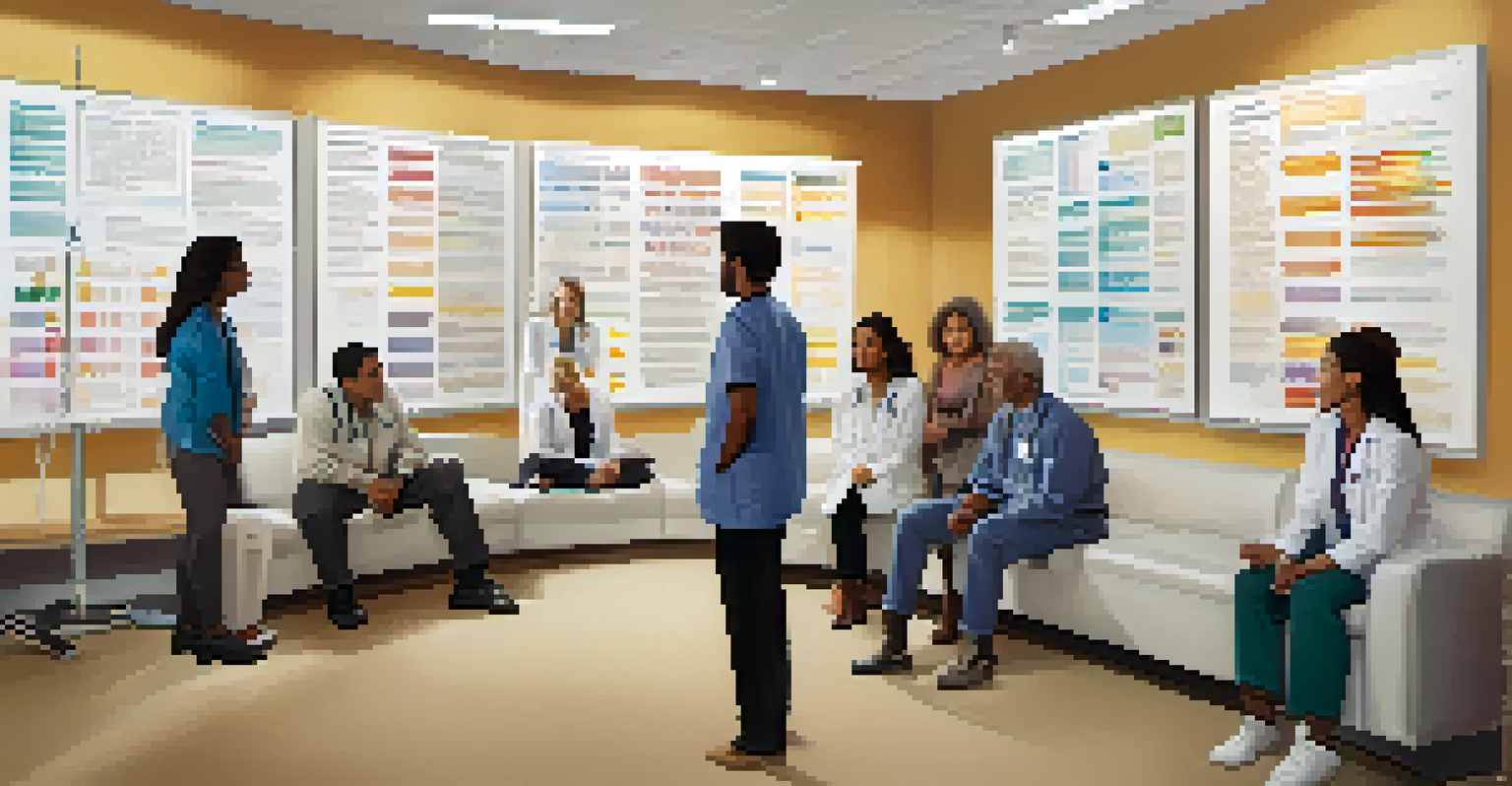Implementation of Pharmacogenomics in Clinical Settings Today

Understanding Pharmacogenomics and Its Importance
Pharmacogenomics is the study of how genes affect a person's response to drugs. This field combines pharmacology and genomics to develop effective, safe medications tailored to individual genetic profiles. By understanding these genetic variations, healthcare providers can optimize drug selection and dosing, significantly improving treatment outcomes.
Pharmacogenomics is a key ingredient in the future of personalized medicine, allowing for more tailored and effective treatment strategies.
Imagine a puzzle where each piece represents a different aspect of a patient's health. Pharmacogenomics helps fit these pieces together, allowing doctors to see a clearer picture of how best to treat their patients. This personalized approach not only enhances efficacy but also minimizes the risk of adverse drug reactions.
As we move towards more personalized medicine, the importance of pharmacogenomics grows. It's not just about finding the right drug; it's about finding the right drug for the right patient at the right time.
Current Applications in Clinical Settings
In today's clinical settings, pharmacogenomics is being integrated into routine practice. For example, many hospitals now use genetic testing to guide medication decisions for patients on anticoagulants, ensuring safer and more effective treatment choices. This application illustrates how genetic insights can lead to immediate, real-world benefits.

Moreover, some cancer treatments are tailored based on the genetic makeup of tumors. Oncologists can select therapies that specifically target the genetic mutations present in a patient's cancer, enhancing effectiveness while reducing unnecessary side effects. This targeted approach exemplifies the potential of pharmacogenomics in improving patient outcomes.
Pharmacogenomics Enhances Treatment
Pharmacogenomics tailors medications to individual genetic profiles, improving effectiveness and reducing adverse reactions.
As more healthcare systems adopt pharmacogenomic testing, we are likely to see an increase in its applications across various specialties. From psychiatry to cardiology, the ability to personalize treatments is revolutionizing how conditions are managed.
Challenges in Implementing Pharmacogenomics
Despite its promise, implementing pharmacogenomics in clinical settings poses several challenges. One major hurdle is the lack of standardized guidelines for genetic testing and interpretation of results. Without clear protocols, healthcare providers may struggle to apply these insights effectively in their practice.
The integration of genetic testing into clinical practice can lead to safer and more effective treatments, enhancing patient outcomes significantly.
Additionally, there is often a gap in education and training regarding pharmacogenomics among healthcare professionals. Many clinicians feel unprepared to integrate genetic data into their prescribing practices, leading to hesitancy in adopting these advancements. Addressing this knowledge gap is crucial for widespread implementation.
Finally, issues related to patient access and insurance coverage for pharmacogenomic testing can also hinder progress. Ensuring that patients can benefit from these innovations requires navigating complex healthcare policies and advocating for broader coverage options.
The Role of Education and Training
To successfully incorporate pharmacogenomics into clinical practice, education and training are vital. Healthcare professionals need to understand not only the science behind pharmacogenomics but also how to apply it in patient care. This knowledge will empower them to make informed decisions based on genetic information.
Many institutions are now offering specialized courses and workshops on pharmacogenomics, helping to bridge the educational gap. These programs often include case studies and hands-on training, allowing healthcare providers to see firsthand how genetic data can impact treatment choices.
Education is Key to Adoption
Training healthcare professionals in pharmacogenomics is essential for its successful integration into clinical practice.
By prioritizing education in pharmacogenomics, we can cultivate a workforce that's ready to embrace these advancements. Ultimately, this will lead to improved patient care and more effective therapeutic outcomes.
Patient Involvement in Pharmacogenomic Testing
Engaging patients in pharmacogenomic testing is essential for its successful implementation. Patients who understand the benefits of genetic testing are more likely to participate, leading to more personalized and effective treatments. Educating patients about how their genetics can influence medication response can foster a collaborative approach to healthcare.
For example, conversations between healthcare providers and patients about the potential advantages of pharmacogenomic testing can help demystify the process. When patients feel informed and involved, they are more likely to adhere to treatment plans tailored to their genetic profiles.
Ultimately, patient involvement not only enhances the effectiveness of pharmacogenomic applications but also promotes a sense of ownership over their health journey.
Future Directions for Pharmacogenomics
The future of pharmacogenomics looks promising, with ongoing research aimed at expanding its applications. As we continue to uncover the complexities of the human genome, new insights will emerge, further refining how we approach medication management. The potential to discover novel genetic variants that influence drug response could lead to even more personalized treatments.
Moreover, advancements in technology, such as next-generation sequencing, are making genetic testing more accessible and affordable. This trend could democratize pharmacogenomic testing, allowing a broader range of patients to benefit from personalized medicine.
Patient Engagement Drives Success
Involving patients in pharmacogenomic testing fosters collaboration and leads to more personalized and effective treatments.
As the field evolves, we can expect regulatory bodies and healthcare organizations to develop more comprehensive guidelines for integrating pharmacogenomics into standard care. This evolution will help ensure that both patients and providers can navigate this landscape with confidence.
Conclusion: Embracing the Pharmacogenomics Revolution
In conclusion, the implementation of pharmacogenomics in clinical settings today represents a revolutionary shift in patient care. By harnessing genetic insights, healthcare providers can tailor treatments that enhance efficacy and minimize risks. This personalized approach not only improves outcomes but also empowers patients to take an active role in their health.
While challenges remain, the ongoing education and engagement of healthcare professionals and patients will drive the successful integration of pharmacogenomics. As we continue to learn and adapt, the potential of this field will only grow, making it an indispensable part of modern medicine.

Embracing the pharmacogenomics revolution is not just about keeping up with science; it's about prioritizing patient-centered care that truly meets individual needs. The future of healthcare is bright, and pharmacogenomics is leading the way.